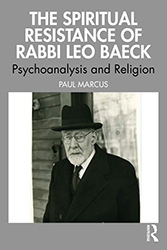Rabbi Mordecai Kaplan was a towering and controversial presence in the history of twentieth-century American Judaism but, in the view of Mel Scult, professor emeritus of Judaic studies at Brooklyn College and biographer of Kaplan, is often misunderstood and not widely appreciated today. To correct these misunderstandings and underscore Kaplan’s continuing importance, Scult has undertaken a thorough exposition of all aspects of Kaplan’s thinking. Based on more than forty years of study, personal acquaintance, and, most important, Kaplan’s personal diaries, the record of sixty-five years of his thought — in Scult’s view, Kaplan’s “very soul” — Scult makes a cogent case for the importance of Kaplan’s groundbreaking rethinking of Judaism.
Brought up in a traditional Ashkenazic Orthodox home, Kaplan was steeped in Jewish knowledge. Educated at the City University of New York and Columbia University, with degrees in philosophy and sociology, Kaplan was influenced by the thought of John Dewey, Ralph Waldo Emerson, and Èmile Durkheim early in his career. He was also ordained at the Jewish Theological Seminary and was a congregational rabbi, most notably at the Society for the Advancement of Judaism, which he founded in 1922. Kaplan taught at JTS for more than fifty years and earlier had helped shape the Jewish Center, a synagogue plus community center — the first “shul with a pool and a school.”
A believing American and a believing Jew, Kaplan understood both the attraction of assimilation and the threat it posed to Judaism, which he saw losing its relevance in a modern secular society. To make Judaism functional and meaningful in this world, Kaplan spent his life “reconstructing” Judaism. Chapter by chapter, Scult examines Kaplan’s reconstruction. “Nationalism and Righteousness” and “Universalism and Pragmatism” explore the philosophic underpinnings of Kaplan’s thought in relation to other progressive thinkers and Judaism; “Kaplan and His God: An Ambivalent Relationship” and “Kaplan’s Theology: Beyond Supernaturalism” indicate the complexity and sometimes density and inconsistency of Kaplan’s thought in working out a rational but profound concept of an impersonal God. In later chapters, as Scult looks at Kaplan’s daily practice and writings on ritual and observance, a persuasive picture of Kaplan as a devout if radical Jew emerges.
Throughout the book frequent quotations from Kaplan’s writings and, more pointedly, his diary underline the deep attachment of Kaplan to the Jewish people, to the evolution and expansion of Judaism as a force for all humankind, and to his concept of God. In the end Scult agrees with the Orthodox Society of Rabbis, who in 1945 excommunicated Kaplan, that Kaplan was a heretic, a heretic who reconstructed Judaism from its increasing loss of significance into a vital and meaningful force in contemporary life. This is not a biography; readers will find little information on Kaplan’s life here. The Radical American Judaism of Mordecai M. Kaplan is true to its title, rigorously examining Kaplan’s bold thinking and innovative contributions to Jewish life in America. Appendix, bibliography, index, notes.
Related content:
Maron L. Waxman, retired editorial director, special projects, at the American Museum of Natural History, was also an editorial director at HarperCollins and Book-of-the-Month Club.





